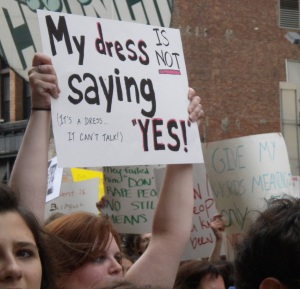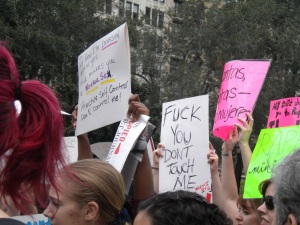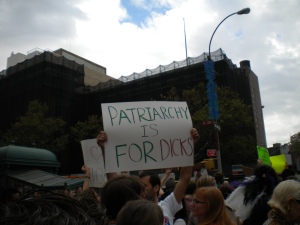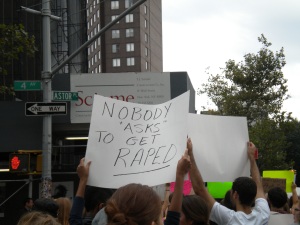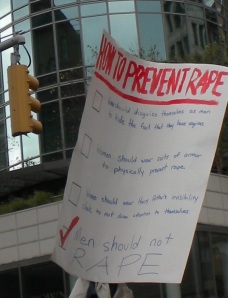I recently read a zine titled, “FUCKED: on being sexually dysfunctional in sex-positive queer scenes” about the ways various feminist writer’s engaged in sex-rejection, running on a scale of celibacy to revulsion to disinterest, primarily in response to the traumas of compulsory heterosexuality, compulsory sexuality, and misogyny. I myself am FUCKED, so seeing myself in this zine was not only cathartic, but also inspired me to further think critically about sex positive feminism.
Even though I am a supporter of this zine, I don’t want to equate sex negativity with being sex dysfunctional, because I don’t want the standard idea of sex to be seen as sexually functional. The current popular model of sex, in which power-exchange is enforced through sexual relationships, not love and intimacy, is already dysfunctional.
Instead, I will define sex negativity as the act of rejecting the inherent power-exchange prevalent in the sexual prototypes that are currently inherent in heterosexual sex by disengaging oneself from sex completely until a model of sexuality that emphasizes equality is clear and prevalent. I would even argue that these patriarchal sexual prototypes are prevalent in homosexual and queer sex whenever heterosex is the model for reference (thanks compulsory heterosexuality!!! 😐 ) Sex negativity is one of the core values of radical feminists.
I have issues with radical feminism, mostly regarding whorephobia and transphobia, however I value sex negativity. That said, I do not think sex positive is a malicious movement and I do not believe spending the majority of my energy tearing down different feminist philosophies is the path to winning the good path. I am, however, offering a critique of sex positive feminism and an endorsement of sex negativity in hopes to encourage more critical thinking in the sex positive community about the implications of their movement.
What’s wrong with sex positive tho?
Sex positive will be defined in this blog post as a feminist model that uses consent as the path towards sex that does not echo patriarchal models of intimacy. There is nothing inherently wrong with this model, on an individual basis, however, I will argue that it does not apply to all peoples and this exclusion is problematic when the sex positive is pushed as a societal revolution.
For instance:
- In sex positive circles, it is paramount that everyone is okay with their own nude body and the nude body of others. It is even more paramount for that nude body to experience a moment of sexual bliss. The grandness of this issue is always pressing and is always discussed at every gathering. I have no statistical data, however, I would wager much more so than other national and global issues, judging on how often clitorises are talked about at your average party. (Sideline: Possibly your next drinking game.) This is problematic because for so many oppressed people their sexual baggage is far from the most tragic issue in their worldview or their immediate lives. The sex-positive obsession blindsides us from those who are too preoccupied or too indifferent to talk and talk and talk about sex. There are many, many intersectional-feminist issues, and for many oppressed-peoples, sexual baggage is far from the top of their lists.
- Even though the sex positive circles I have been around value good consent so deeply, to the point where followers willingly go to workshops and classes and really put in the A+ effort, they have created an environment where saying no is challenging. There is a mob mentality at work. It is everyone else being so open and sexual and casual, and then there is you, the singular. The one exception. There is a lot of pressure to buckle up, not be like one of those “radical feminist prudes”, and just go with the flow. This is never a good recipe for good consent or healthy power-dynamics.
- Not only that, but there isn’t much room in sex positive feminism community for those who do not enjoy sex, nudity, and/or kink. There isn’t much room for those who want exclusively emotional, romantic sex. There isn’t much room for those who want to have monogamy or those who want to uphold their religious or cultural customs. There isn’t much room for trauma survivors who do not want to be around literal and theoretical sexual people. There isn’t much room for those who are not sexual and are comfortable with their disinterest to repulsion of sex. This lack of space for all these various disinterests in sex, nudity, and kink, creates rips and tares in sex positive feminism where the good-motivations come out. An erasure of my fellow-oppressed-people who do not want sex positive in their lives is not good feminist practices. It creates easily slip-’n-slides for classism, ableism, and racism.
- I also want to note that most of my in-person sexual objectifying experiences have come from casual intimacy with sex positive feminists. I have had sex/kink partners, formed what I thought was companionship, only to find myself exchanged and ignored, for a newer, younger sex toy at the next party. I have quit going to public events, with none of my former sex partners ever reaching out to continue seeing me in private. As soon as I slipped out, another body slipped in. It seems to be that the whole point of these events is to have sex, with little care on who you are fucking or how they feel about you during or after such sex. I’m not asking for romantic proposals from everyone I been intimate with, but I am asking to be respected. To be treated as something more than the body who is at the same party as they are. I don’t see what is so radical or feminist about objectifying your sex-partner.
When sex positive feminism fails you, where do you go?
Sex positive was the first feminist movement I found. I wouldn’t say it created me, as so much of my own ideals were echoed in the movement, when I joined six years ago at the humble age of nineteen, however as my ideals waned, the perfect-fit euphoria, I once was filled with, waned as well. I still cherish the values that built my sex positive. I do, even still, believe that the kyriarchy finds strength in over-sexualizing / annihilating-the-sexuality of oppressed peoples. I enjoy rebelling against the norm by embracing the darker, perverse, and selfish parts of my sexuality that are, by far, not for my oppressors.
That all said, as I explored sex negativity, I found way more philosophies clicked then I expected. It wasn’t all radical feminists telling their wives to castrate their husbands, “become” lesbians, and then be as transphobic and whorephobic as fuck. These attitudes exist in the sex negative/radical-feminist movement, but there are other ideas in radical feminism I want to extract.
Sex negativity is more bluntly honestly about the dark truth sex positive, especially in the BDSM scene, completely ignores.
The same kyriarchy that has seeped into oppressed people’s sense of selves, career paths and hobbies, inner and outer conflicts, health and wealth and communal influence, and onward, also has influenced our sexual experiences.
And saying no, stepping out of the field, not wanting to have sex anymore, is a perfectly valid response to this. Because what is a clitoral orgasm worth when you are a lifetime into bad consent, sexual assaults, rape, and abusive relationships?
This is why I welcome sex negativity because sometimes I just say no. Sometimes I sincerely wish that non-reproductive sex didn’t exist. Sometimes the plethora of sexual-highs that sex-positive feminists are so eager to list out isn’t worth the risk of one such feminist assaulting me.
I’m not saying sex negativity is the answer and everyone should get down on my bitter level. I am saying that sex positive is worshiped as the grail, like it is what feminists have been working towards. Meanwhile, it can perpetuate the same bad consent, racism, and selfishness we all call the kyriarchy out on. There is definitely value in enjoying sex, but not everyone wants or cares about enjoying sex.
Additional Reading List:
FUCKED: on being sexually dysfunctional in sex-positive queer scenes
The Ethical Prude: Imagining An Authentic Sex Negative Feminism


